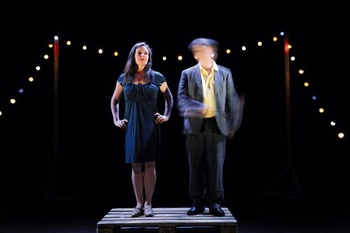The latest piece from Forced Entertainment serves up a barrage of visions of the future, utopian prophecy, and doom-mongering voiced by the work’s two characters. We asked the author and director Tim Etchells why he enjoys predicting the future.
“We were talking a lot about hope, which was the theme of the Belluard Bollwerk Festival in Freiburg, for which we made the piece,” says Tim Etchells. “We wanted to exchange stories which were either extremely optimistic or extremely pessimistic. That mutated during the process into the idea of describing different versions of the future.”
Futurology is a tricky business for scientists, but writers of fiction have a free hand.
Tim Etchells: One of the things that Tomorrow’s Parties does is recycle the stories and the genres of future-thinking that we know either from the media – like the current reports on global warming or religious conflicts – or from science fiction scenarios in film and literature. The piece recycles all our ideas about what the future might bring. It draws on fantasies and fears and the sense
of possibilities that we have at this time.
Seems like a funny piece to write. But it is certainly a subject that fires the imagination.
Etchells: In the end it became almost a little competition between the two performers, who are, so to speak, trading these little fragmented, distilled versions of what the future might be like. One has to think of something that is even more pessimistic, more optimistic, or more inventive than what the other one came up with.
Is there a difference between the two characters?
Etchells: They are different. The guy is prone to more elaborate and absurd predictions. Some of the “futures” you know very well from the front pages; others amplify an idea and take it to a ridiculous conclusion full of inventive pleasure. The woman is more poetic. Listening to her you feel like you are being taken into a totally different kind of imaginative space.
Forced Fast Forward


Did you have any rules when writing?
Etchells: The rules that we arrived at are about vividness. When you are listening to the stories and fragments they should conjure up a picture or should make something happen in your imagination. That is something we work very hard on with the company: we use language that is sometimes very simple, to paint pictures and to make scenarios that are very immediate and tangible.
So what did you learn from this in the end? Is the Apocalypse pending?
Etchells: The only prediction that recurs is the one that says that things will stay pretty much the same. Which I like. The first time that prediction is made, the character talks about the fact that people in the future will still fall in love and have jobs. The second time he predicts that people will still exploit each other and that there will still be rich and poor.
What is interesting is that the piece is also a mapping of the present and of the past. It talks quite a lot about “now”, in a sort of critical way. And many of the futures that it predicts are pasts, for instance in the sense that they talk about scavenging people, living in abandoned buildings, living primitive lives like cavemen.
The set is simply a wooden platform with some colourful light bulbs.
Etchells: It has the feeling of a carnival sideshow. You pay a few coins to hear what the future is going to be. The performers step onto this little platform and their task is to speak up for an hour and to fill it with possibilities.
Photo © Hugo Glendinning
Tomorrow’s Parties
28 > 31/3 • 20.30, €12/16, EN
Kaaistudio’s Onze-Lieve-Vrouw van Vaakstraat 81 rue Notre-Dame du Sommeil, Brussel/Bruxelles,
02-201.59.59, www.kaaitheater.be
Read more about: Podium
Fijn dat je wil reageren. Wie reageert, gaat akkoord met onze huisregels. Hoe reageren via Disqus? Een woordje uitleg.